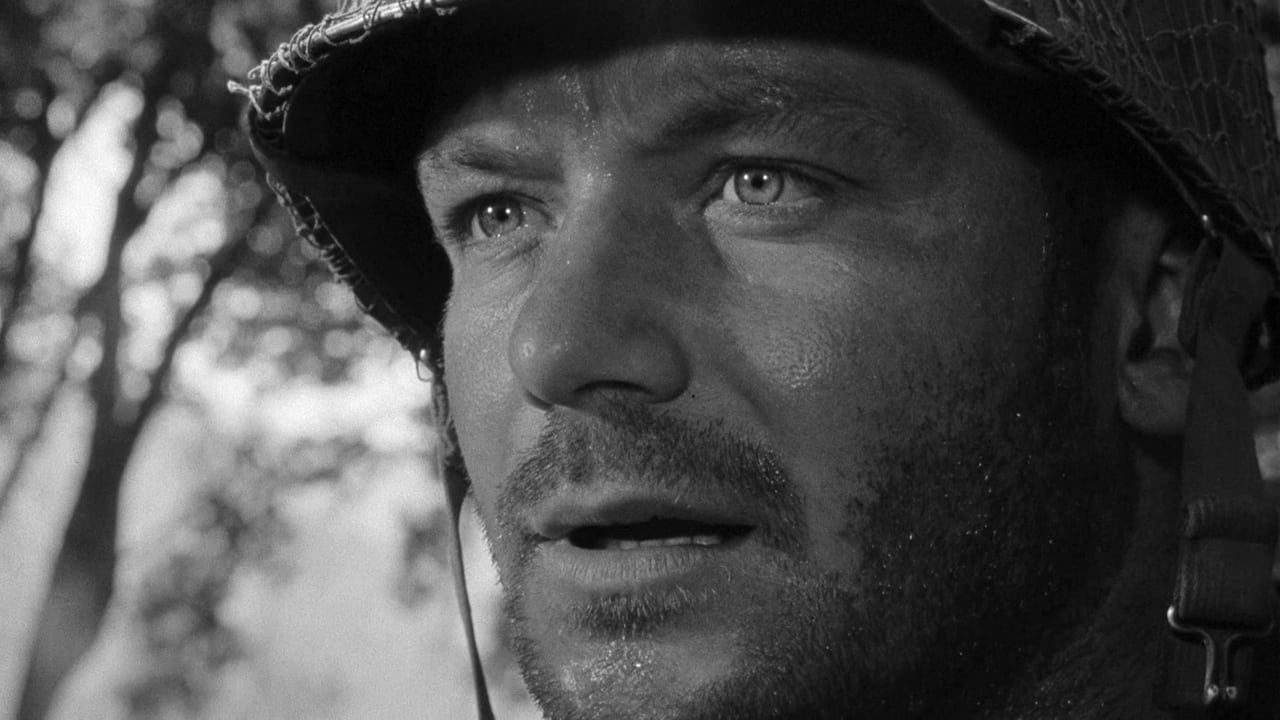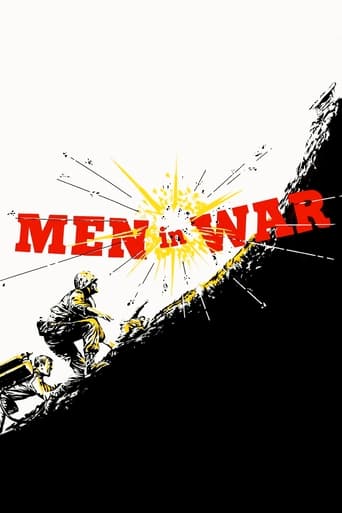

Truly Dreadful Film
... View MoreGood , But It Is Overrated By Some
... View MoreI wanted to like it more than I actually did... But much of the humor totally escaped me and I walked out only mildly impressed.
... View MoreThe tone of this movie is interesting -- the stakes are both dramatic and high, but it's balanced with a lot of fun, tongue and cheek dialogue.
... View MoreTough Korean War film about a platoon of US soldiers led by Robert Ryan who have to fight their way up an occupied hill in order to escape the encircling enemy. It looks like it was made in a dry canyon somewhere in Southern California, but, in spite of that, the excellent B&W photography help make this as gritty a Korean War film as you're likely to see. The film's emphasis on the characters is perhaps laid on a bit too much. Everyone seems to be a bit on the philosophically existentialist side, bringing the audience men in war rather than try to overly focus on battle scenes. In any event, the taking of the hill nicely combines both action and character along with staggering losses. Recommended for Ryan's part as the lieutenant who keeps the men as a viable fighting force up to the end.
... View MoreBy good luck, I came across a VHS video (good print) of this 1950s Anthony Mann film. It was well worth watching. It is stark, unflinching, and offers an altogether convincing depiction of how soldiers behave in a harrowing, no-win situation. Robert Ryan and Aldo Ray, both truly fine actors, are excellent in their symbolically contrasting roles of two kinds of military men. Robert Keith and Vic Morrow are standouts in supporting roles. Keith is especially wonderful in an essentially non-speaking,though key, part...his face says it all. The music by Elmer Bernstein and the cinematography by the great Ernest Haller are perfect...the soundtrack creepy and other-worldly, and the cinematography capturing the "no man's land," confusing, deadly landscape in longshots, as well as the emotions of the soldiers when photographed close-up. See this film!
... View MoreAs I say in the summary, this film compares very well with Sam Fuller's "Steel Helmet", though this Fuller film was actually made during the Korean War and it was made with an even smaller budget. They both are exceptional films--stories of foot soldiers stranded behind enemy lines during this war. Because both have rather modest stories, the films manage to work because of taut direction, excellent writing and terrific acting. It just goes to show you that you don't need a ton of cash or the biggest name actors to make a very good war film.The film starts with Robert Ryan playing a lieutenant in charge of a dozen and a half men who have been cut off during an American retreat early in the Korean War. Their goal is to go 17 miles to a hill PROBABLY still held by their forces. But it is very slow-going--particularly when their truck is knocked out and they have to carry their supplies. Things seem to be looking up when a jeep arrives. But the driver is a gung-ho sergeant (Aldo Ray) and his colonel (Robert Keith). This is a problem because Keith obviously has cracked up and is catatonic and Ray has no interest in doing anything but get his commanding officer back to a hospital--and he could care less about the other men. But, when Ryan forces Ray at gunpoint to relinquish the jeep, you know this is NOT your typical war film! There's a lot more to the film than this--as this all occurs in the first ten minutes or so, but I'll leave it to you to see where all this leads. The bottom line is that this is an amazingly tense and well-constructed film--one you can't help but admire because of its efficient use of actors, props and sets.
... View More'Men in War (1957)' had been sitting on my video shelf for quite a few months, but I was very interested in watching it. Anthony Mann, generally known for directing Westerns, here avoids the conventions of his favoured genre, and a brief glimpse of the opening scene had promised a stark, realistic war-time drama, unconcerned with patriotic gallantry and instead focused on the psychological torment of being exposed to continuous conflict. My expectations were, for the most part, excellently met. In a wonderful year that included stunning war pictures from Stanley Kubrick, David Lean and Mikhail Kalatozov, 'Men in War' manages to hold its own, despite what was likely a comparatively low production budget. Part of the film's merit lies in its focus on characters. There are, in fact, two "wars" at play in the film: between the American platoon and their faceless Asian enemies, and between feuding soldiers Lt. Benson (Robert Ryan) and Sgt. Montana (Aldo Ray), who must construct a tentative alliance if they are to emerge intact from enemy territory.In 1957, Stanley Kubrick released 'Paths of Glory (1957)' which featured perhaps the most spectacularly realistic scenes of warfare until 'Saving Private Ryan (1997).' Mann's film, produced in the same year, strives for a more modest brand of realism, one less concerned with fireworks than with isolation punctuated by the unexpected threat of danger. In most WWI and WWII pictures, the major battles are played out amid gunshots and canon-fire, exploding earth and dying soldiers. The Korean War (1950-1953) presented American soldiers with a new kind of conflict: guerrilla warfare. Lt. Benson leads his platoon through enemy territory in an improvised retreat, and, at times, it even seems as though the men are engaged in a peaceful forest hike – the unbroken silence is not unnerving, as it probably should be, but deceptively reassuring. One soldier (James Edwards, the pioneering African-American actor from 'The Set-Up (1949)') even appears to forget his circumstances entirely, lulling himself into a false sense of security that is sharply and inevitably encroached by a silent enemy ambush.Robert Ryan is ideally cast in the leading role, bringing to the character his characteristic intensity, world-weariness and self-doubt. Though undoubtedly a dedicated leader, Lt. Benson finds even his own resolve cracking under the pressure of seclusion and imminent, unseen peril. Even more interesting, however, is Aldo Ray as Sgt. Montana, who would be a selfish, dishonourable scumbag if it weren't for his unwavering devotion to a shell-shocked colonel (Robert Keith), and his meticulous knowledge of enemy tactics. The remaining soldiers, including Vic Morrow and L.Q. Jones, are unfortunately relatively anonymous characters, and their eventual dispatching is mostly without emotion – or perhaps by then we've simply become so hardened to the prospect of death that we can't feel anything. Though the obligatory heroic ending strays onto the beaten track, I was mostly impressed with how 'Men in War' generally avoided clear-cut heroics. The soldiers killed by enemy attacks are betrayed by unlucky circumstances or momentary lapses of judgement; even the final assault on an enemy stronghold seems almost pathetically inadequate.
... View More